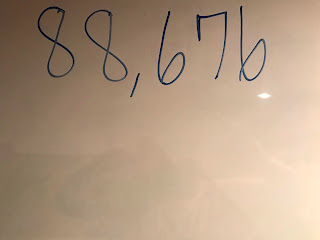Curriculum Source: Envision Math 2.0 (Scott Foresman, Addison Wesley)
Content Standards:
- 4.NBT.A.1: Recognize that in a multi-digit whole number, a digit in one place represents ten times what it represents in the place to its right.
- 4.NBT.A.2: Read and write multi-digit whole numbers using base-ten numerals, number names, and expanded form
Mathematical Practices Used:
- MP.2: Reason abstractly and quantitatively
- MP.3: Construct viable arguments and critique the reasoning of others.
- MP.8: Look for and express regularity in repeated reasoning
Mini Lesson:
Explain to students that they have learned how to read and write numbers in different ways.
Anchor Chart with the different ways to write numbers should be displayed for students
Today they are going to learn how to explain the relationship between adjacent digits. (Review the word adjacent)
Write the following number on the board 88,676
· Write the number on a place value chart then write the value of each digit.
- Explain that the 8s are adjacent to each other so the value of the 8 in the ten thousand place is ten times greater than the 8 in the thousand place to check I can multiply 8,000 x 10 = 80, 000
- Explain that the 6 in the hundreds place is 100 times greater than the 6 in the ones place because 6 x 100 = 600
Explain to students that in order for a digit to be ten times greater they have to be next to each other and the same digit
Practice: students solve questions 1 and 3 on page 13
*The Highlighted Problems
Teacher check students work and review solutions with students
1.(Sample Answer): No; The 5s have to be next to each other for the value of one 5 to be ten times as great as the value of the other
3. 7,000; 700; The value of the first 7 is ten times as great as the value of the second 7.
Students complete Quick Check or Independent Problems: 6,12, and 20 for assessment and differentiation
6. 50,000;5,000
12. 6,000;60
20. B
After students complete the quick check, students are placed into groups based on their results.
0-1 points intervention (group I)
2 point On level group (o)
3 points (group A)
Group Istudents will work in small groups with teacher on Intervention lesson for 10 minutes then work independently to complete intervention work sheet
Group O and A solve question 13-20
Group A Intervention Lesson:
· Give each student an intervention sheet 1-2
· Have each student write a 3 digit number on their place value chart with two digits that are next to each other the same
· Have each student (one at a time)
1. write their number on the board
2. read the number aloud
3. write the value of each digit
4. explain the relationship between the digits that are the same
· Have students practice by completing the intervention sheet
· Students who understand move on to the second activity, review intervention sheet with remaining students.
Teacher will check in with groups A and O to review questions and solutions.
Closing:
Ask students to turn to a partner to explain when are digits ten times the value of another digit
Reflection: My take away from this week post is that it is place value relationships are the core of all the other topics in the fourth grade. The goal would be for students to learn that in a multi digit whole number, a digit in one place represents ten times what it would represent in the place immediately to its right. It is important for our students to have resources available to them, such as Place Value Charts, Vocabulary word walls and anchor charts to better assist and give a visual to their learning.














Amazing work! Love the lesson plan; very detailed, clear and concise.
ReplyDeleteFiorela… how might you use this lesson plan in your own classroom? Expand on your thoughts.
DeleteMaalik this is a great post. I feel that understanding place values is something that I am going to be teaching in my classroom one day. I am a big fan of the place value chart as it clearly illustrates the information we are trying to get across. I also appreciate the example lesson plan. It clearly laid out how to tackle this subject with just a white board. Aside from that I would be curious which types of manipulates we could use for this to better help our students learn?
ReplyDeleteGreat reflection... Who posted this?
DeleteHi this is James Hartmann Thanks for letting me know
ReplyDelete-James Hartmann